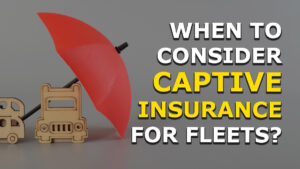
Are you ready to start a new trucking company? Maybe you already obtained your USDOT number and motor carrier operating authority.
There are many steps you need to take to get started. For a complete guide, read more on how to get rolling in 10 steps.
Before getting insurance, make sure you gather all the necessary licenses, authorities, and registration requirements for the types of loads and areas you plan to haul.
FREE GUIDE | 7 Steps To Start and Run A Successful Trucking Company
If you have not done this yet, our sister company Compliance Navigation Specialists can walk you through everything you need to get your company set-up.
But when can you start looking for insurance and what kinds of coverage do you need? We will walk you through the basics.
Trucking insurance basics when getting started
Now you are ready to obtain the correct insurance for your company. There are different types of insurance available and often are required to cover certain aspects of your trucking company.
These include:
- Primary Liability
- Cargo Insurance
- Physical Damage
- Non-Trucking Use (Bobtail)
- Worker’s Compensation Insurance
Primary Liability: It is important to keep in mind your legal requirements. Trucking insurance is mandatory in all 50 states, and not having proper insurance could cost you pricey fines or your license.
To stay legal on the road, you are required to have primary trucking liability insurance as a minimum. As a truck driver your primary liability insurance must be at least $750,000 worth of coverage.
Non-trucking (Bobtail) Liability: All time spent in a truck is not billable, but it is insurable. When you use your truck for non-business purposes, you need insurance coverage.
Non-Trucking Liability offers liability coverage for property damage or bodily injury to a third party when trucks are being used for non-business purposes.
Cargo Insurance: In addition to covering your vehicles, it is just as important to protect the cargo that you are hauling, whether it is yours or a clients’ cargo.
Truck Cargo coverage insures the contents of the trailer, temperature-control machinery, and other appliances or accessories that keep cargo secure.
Coverage is custom-evaluated for the type of commodities hauled and the requirements of the shipper.
Below is a list of all risk and broad form policies to consider:
- Reefer breakdown
- Loading and unloading
- Debris removal
- Pollution clean up
- Aggregate deductibles
- Earned freight charges
- High valued commodities requiring limits of $250,000 per vehicle or higher
Physical Damage Insurance: Any time you drive, you are exposed to risk. Your truck could be damaged in an accident or from another disaster. It could be stolen or vandalized. Any of these issues could put your truck out of commission and compromise your business.
Physical damage insurance coverage is not required on your truck unless your vehicle is leased. If it is, then you are most likely required to have Physical Damage insurance.
On the other hand, if your vehicle is fully paid for, physical damage coverage is optional, however, it offers 24-hour collision coverage for damages to your tractor or trailer.
- Collision, Comprehensive or Specified perils
- Aggregate and combined deductibles
- Rental reimbursement
- Gap coverage
- Personal effects for drivers
- Towing coverage
- Electronic Equipment coverage
- Downtime Loss Expense
Worker’s Compensation Insurance: If you have one or more employees and do not carry workers compensation insurance, you will be liable for these costs, and additionally be subject to fines and fees based upon the state your operation resides in.
Workers compensation insurance protects your employees and your business from work-related illnesses or injuries. The coverage is mandated by each state and the workers compensation laws and benefits vary by state.
If trucking workers’ compensation insurance is mandatory, it can provide coverage for:
- Medical Expense
- Rehabilitation
- Death Benefits
- Missed Wages
Employees filing claims for workers’ compensation insurance can only do so if their injury or illness is caused by their duties while on the job and often include:
- a slip or fall
- a strain on the body from heavy lifting
- injuries that have resulted from an accident while operating machinery
The injured parties must visit a healthcare professional immediately so a medical doctor can provide medical reports to support any claims. Upon approval by the insurance carrier, the employee will receive compensation payments and can return to work when cleared.
Fleet owners who lease on to motor carriers sometimes need to offer workers’ compensation coverage for their employee drivers.
Owner/operators have the option to purchase their own coverage called Occupational Accident Insurance (OAI). OAI and is used for medical benefits and disability coverage in the event of an injury on the job.
This coverage option typically costs about half of a traditional workers compensation policy coverage cost. It will not have all the benefits that workers compensation coverage provides.
Tips to consider when looking for commercial truck insurance
The first tip to consider is to shop around. There are a lot of insurance companies out there and many different coverages to consider. We will shop you around to get you the best rate as some carriers are weary of new CDL drivers due to the level of risk involved.
Second, when starting out, consider your operating radius limitations. Insurance companies may limit your radius of operation as you get started. It is important to limit yourself to a smaller hauling radius when you are starting out.
Finally, lower your credit score. It has been found that your personal credit score can have a direct correlation to the number of and possibility of claims in the future. Keeping your credit score low or attempting to lower it is always a good idea.
Get started with your New Venture Quick Quote >>> CNSINSURES.COM/NEW-VENTURE-QUICK-QUOTE
If you have any questions or concerns, please call us at 800.724.5523 or email info@cnsinsures.com.





